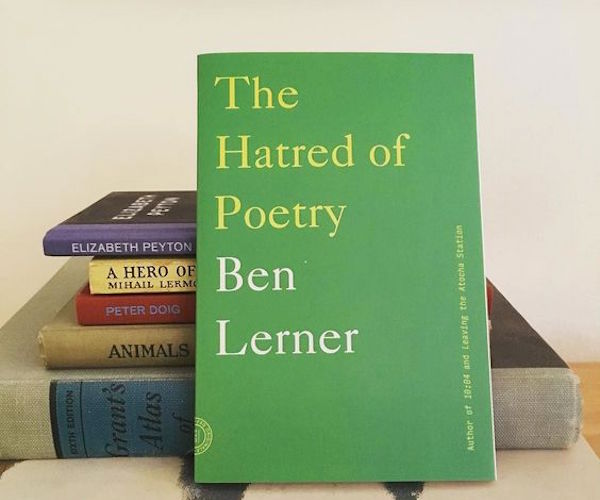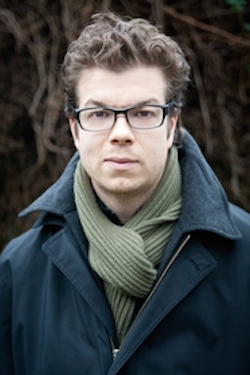Book Review: “The Hatred of Poetry” — Thinking the Worst About Verse
The Hatred of Poetry claims to explore our culture’s rampant animosity toward the entire art form.
The Hatred of Poetry by Ben Lerner. Farrar, Straus and Giroux, 86 pages, $12.00.

By Troy Pozirekides
“Truth is like poetry. And most people fucking hate poetry.” – Overheard in a Washington, D.C. bar by Michael Lewis, author of The Big Short
I remember that line getting a pretty big laugh when I saw the film adaptation of Lewis’ book in theaters earlier this year. I also remember feeling (while, to be fair, also laughing) that I may very well be the only person in the theater who doesn’t hate poetry, and who has spent a significant portion of my life reading it, writing about it, and in general caring about it. So when, later in the year, I saw that Ben Lerner, an acclaimed poet himself, author of the critically buzzed novels Leaving the Atocha Station and 10:04, and a MacArthur Fellow, had published a book-length essay entitled The Hatred of Poetry, I was brought back to that moment in the theater, and to the question that entered my mind shortly thereafter: why do so many people profess, often gleefully, a hatred of poetry?
On the surface, that’s exactly what Lerner is trying to get at in his book. Judging from the title alone, one might think The Hatred of Poetry is a helpful book for someone attempting to understand why they themselves hate the art. After all, the book’s opening paragraph describes an experience most of us have had, at one point or another in our schooling:
In ninth grade English, Mrs. X required us to memorize and recite a poem, so I went and asked the Topeka High librarian to direct me to the shortest poem she knew…
Our (and ninth grade Ben Lerners’s) feeling: poetry is a chore, poems tiresome things, to be memorized by rote. You can almost hear a weary classroom chorus, reciting a mothbally bit of verse with the same collective enthusiasm they give to the Pledge of Allegiance.
However, any hope for poetry’s pure haters among us quickly fades away because, within the very same opening paragraph, Lerner starts explicating his chosen ninth grade verse – Marianne Moore’s “Poetry” – with the same dry, this-means-that approach that likely turned all of us other ninth graders off poetry in the first place:
Moore’s three [verses], each one of which is interrupted by a conjunctive adverb—a parallelism of awkwardness that basically serves as its form…the deliberately clumsy enjambment of the second line and the third…
As this rapid-fire bit of learned analysis shows, Lerner’s book is not for those who do not already understand (and because so may not like) poetry. Rather, it’s for people who read and have read poetry, and feel things when they do, and who have opinions and knowledge (at least on a basic level) of the art. True, we ought not to fault Lerner for adopting a professorial tone in the essay; after all, he earns his living teaching English at Brooklyn College. But in donning that role so early on, he forecloses an opportunity for dialogue with those (likely the great majority of us) whose ignorance of — and frustration with — poetry merely play-acts as hatred. Ah, well, only so much can be done in 86 pages.
We soon find that what Lerner believes is behind most people’s “hatred” of poetry is a crisis of definition for the art itself. What can poetry do that no other art can? What makes it uniquely deserving of our collective respect and appreciation? He examines a few historical perspectives on the question, the first (and perhaps oldest) by way of the scholar and poet Allen Grossman: “Poetry arises from the desire to get beyond the finite and the historical—the human world of violence and indifference — and to reach the transcendent or divine.” And it’s the failure of this “transcendent impulse” to be fully realized by any one poem, Lerner argues, that ends up short-circuiting the whole endeavor:
You’re moved to write a poem, you feel called upon to sing…but as soon as you move from that impulse to the actual poem, the song of the infinite is compromised by the finitude of its terms…thus the poet is a tragic figure. the poem is always a record of failure.
Therefore the hatred of poetry, when we define the art by its “transcendent impulse,” is really a hatred of its limits; of the inability of any one poem to accurately espouse the ebullience of all human yearning. But what one poem ever could?
This “transcendent” view of poetry is at least out-of-date, and quite possibly out of the running. Especially today, a poet would be wise to recognize the medium’s limits as an aid, not an inhibition. W.H. Auden was right to agree with (and, in his mature work, to promote) C.S. Lewis’ notion of “the Good Drab” as the “characteristic style of modern poetry,” betting that “a quiet intimate tone of voice, the speech of one person addressing one person, not a large audience” has a better chance of cutting through the noise of modern life than any deliberate attempt to arouse the transcendent.

Ben Lerner — for him, poetry is an act of negation. Photo: Matt Lerner.
To bring back this idea to its most fundamental level: if we can neatly define the act of poetry, or at least one aspect of that act, it would have to be the careful selection of the right words. It’s a process of distillation, of bringing language to bear with a “sublime purity…[as in] a bunsen burner, not a bonfire,” to use Thomas Howard’s description of T.S. Eliot’s poetic language. Poets of the “bonfire” variety, of course, have staked out their place in the poetic imagination — the Beats, for instance — but it’s those of the “bunsen burner” variety, carefully honing their quiet craft, who we can most reliably consider “timeless.” This is the reason that, in the aftermath of the tragedy of 9/11, Auden’s pensive, 60 year old work “September 1 1939” found wider currency as the right poem for the moment than did Amiri Baraka’s contemporary, incendiary work “Somebody Blew Up America.”
Another reason people hate poetry, Lerner posits, is because it’s been built up as the “purest expression of [one’s] inner domain,” and that, to the uninitiated, “having to acknowledge one’s total alienation from poetry chafes against the early association of poem and self.” This description of poetry, admittedly widespread but woefully incomplete, is complicated by the fact that Lerner clearly buys into it himself:
Whatever we think of particular poems, “poetry” is a word for the meeting place of the private and the public, the internal and the external: my capacity to express myself poetically and to comprehend such expressions is a fundamental qualification for social recognition.
This view of poetry has a lot to do with the popularity and influence of the Confessional school poets of the 1960s and later. I’d imagine it also has a lot to do with the way poetry is taught to students from early age: as an activity, like finger-painting, with little regard given (outside of the aforementioned cloistered environs of 9th grade English) to the established body of extant poems out there to be explored. If we limit our view of what poetry can do solely to the realm of personal expression (however trendy the idea may be in our contemporary selfie culture), we simultaneously limit its appeal to new readers, who may shrink away from poetry if they think it’s all about the expurgation of our most secret truths.
It’s easy to keep picking away at Lerner’s definitions of poetry like this, but I take greater umbrage with his essay’s general claim, for which he breechloads the definitions as evidence: people hate poetry because there isn’t any one poem that can live up to these definitions. All that a poem can do, driven as it is by an “impulse that can produce no adequate examples,” is “make a place for the genuine by producing a negative image,” Poetry in practice, then, is an act of negation – we may not ever glimpse the white whale, but we can somehow get an idea of what it may look like, or where it may be, by tracing our missteps along the way.
I may be inclined to agree with Lerner, if only his book were entitled “The Hatred of Any One Poem.” But it claims to explore our culture’s rampant animosity toward the entire artform, of which his arguments say very little. Perhaps there is no one poem that can do all that Lerner asks of it, but we ought not to take that as an indication of the futility of poetry writ large. If we were to apply the same logic to, say, music, then we would rightfully be laughed out of the room. No one song or symphony can fully answer the question “what is music?” or live up to any of the definitions that scholars may have come up with over the years, but that doesn’t make us appreciate the art any less. What we may say, in poetry’s case (as well as for its sake), that it is a community, comprised of many individual poems, which, taken together, enable it to overcome the shortcomings of its constituent parts.
Troy Pozirekides is a freelance writer and critic.
